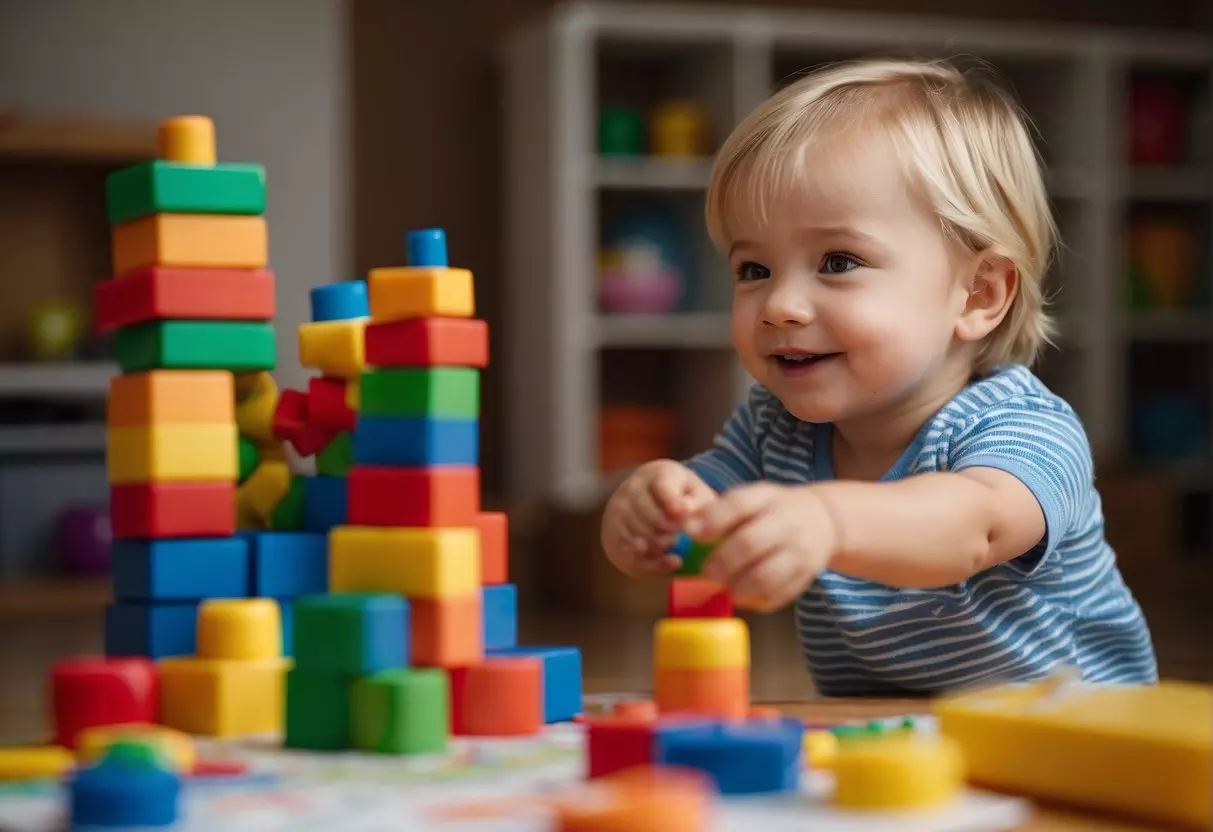Activities for 28-Month-Olds: Fun and Developmental Play Ideas
As the parent of a 28-month-old, you are likely witnessing a whirlwind of development and energy. At this stage, toddlers are a bundle of curiosity and mobility, constantly exploring and learning from their environment. Engaging them in activities that hone their growing skills is a wonderful way to support their development. Activities for 28-month-olds should be safe, age-appropriate, and, most importantly, fun for both of you.

Your little one is at an age where playtime is more than just fun—it’s also about learning and growing. Simple activities like setting up a backyard obstacle course or building a fort out of blankets and pillows encourage physical dexterity and imagination. It’s vital for the activities you choose to stimulate their senses, spark their imagination, and provide opportunities for them to master the fine art of coordination and communication.
Understanding the developmental milestones your toddler should be reaching can guide you in selecting the best activities. From frogs on a lily pad games that improve balance, to arts and crafts that develop fine motor skills, there’s a vast array of enjoyable and educational play options. These play activities can facilitate emotional development and cognitive skills, such as problem-solving and understanding cause and effect, all while they’re having a delightful time.
Table of Contents
Developmental Milestones
At 28 months old, your toddler is reaching new peaks in their development. They’re not just growing physically; their minds and emotions are also blossoming rapidly. Here’s what you can expect in this exciting stage.
Motor Skills
Your 28-month-old is likely very active, displaying improved coordination and strength. At this stage, they can typically run and climb with better agility. Your little one should be able to:
- Move around with confidence and speed.
- Use their hands for tasks like turning doorknobs or unscrewing lids, highlighting their refined motor skills.
Cognitive Development
Cognitive skills at this age are marked by a growing curiosity and ability to understand the world. Your child may show the ability to:
- Sort shapes and colors, indicating a better grasp of categories and similarities.
- Understand and follow simple two-part commands, reflecting their advancing language and cognitive development.
Social and Emotional Growth
Socially and emotionally, your 28-month-old is becoming more independent and may start to:
- Show a broad range of emotions and greater empathy towards others.
- Engage in simple cooperative play with peers, hinting at their developing social skills.
Your toddler’s progress in these areas is a testament to the remarkable journey of growth that characterizes this stage of life. Enjoy guiding and observing their advancement through these developmental milestones.
Physical Activities

Engaging your 28-month-old in physical activities is crucial for enhancing motor skills and encouraging healthy development. From taking them on walking adventures to fostering fine motor skills with crayons, these activities are not only fun but are instrumental in your little one’s growth.
Walking Adventures
Enjoy watching your toddler’s walking skills flourish by taking them on different walking adventures outdoors. Whether it’s a stroll in the park or a safe walk around the neighborhood, encourage your child to navigate various terrains. This can help strengthen their leg muscles and improve their balance. You can turn these walks into educational experiences by pointing out colors, shapes, and nature.
- In the park: Walk on grass, pebbles, and sand for varied textures.
- Around the neighborhood: Notice the leaves, vehicles, and animals.
Kicking and Throwing
Ball games are not only entertaining but are also a perfect way to help your toddler practice coordination and gross motor skills. Start with rolling a ball back and forth and progress to encouraging them to kick a ball or throw it.
- Kicking: Practice gentle kicks with a lightweight ball.
- Throwing: Begin with tossing small balls into a bucket.
Fine Motor Fun with Crayons
Crayons are fantastic tools for boosting your child’s fine motor skills. Supply them with a variety of colors and let their creativity run free on large sheets of paper. This activity aids in hand-eye coordination and teaches them how to grip and control the crayon as they draw.
- Crayons: Experiment with different shapes and color.
- Paper: Use large sheets for ample drawing space.
Cognitive Enrichment

Cognitive enrichment for your 28-month-old focuses on promoting brain development through play and interaction. At this stage, your toddler is ready to expand their vocabulary and engage in more complex forms of imaginative play, which supports their problem-solving abilities.
Language and Vocabulary Expansion
Talk to your child frequently to enhance their linguistic skills. At 28 months, they’re able to learn new words rapidly, so it’s essential to engage with them in conversations throughout the day. Try the Name Game, where you point to items and say their names, encouraging your toddler to repeat after you.
- Read books with simple storylines and ask questions about the pictures to promote word recognition and understanding.
Imaginative Play and Problem-Solving
Imaginative play is a powerful tool for cognitive development. Through pretend play, your child experiments with different social roles and stimulates their creative thinking. Use props and dress-up clothes to encourage this type of play.
- Puzzles and building blocks, as suggested by Lovevery Blog, are great for developing problem-solving skills. Start with simple puzzles and create challenges that require your toddler to think critically.
Sensory Activities

Sensory activities for your 28-month-old can be an excellent way to stimulate learning and development. These activities not only engage their senses but also support the growth of neural pathways.
Exploring Nature
Take advantage of the great outdoors and visit your local park. Encourage your toddler to touch the bark of trees, feel the different textures of leaves, or listen to the birds chirping. This type of sensory activity fuses learning with the natural world.
- Listen: Identify and mimic animal sounds.
- Touch: Collect various natural elements like stones, leaves, and twigs.
Messy Play
Messy play can be sensory-rich, and it’s something your child will love. Set up an area where it’s okay to get dirty, and let them dig into activities like finger painting or playing with mud. Not only is this fun, but it also enhances sensory exploration.
- Sight and Touch: Use shaving cream on a tray to create a tactile experience.
- Smell and Touch: Hide scented objects in a sandbox and encourage your child to find them.
Remember, these activities are not just about play; they’re important for your child’s sensory development and learning process.
Keeping Your Toddler Entertained

At 28 months old, your toddler is full of energy and curiosity, making it the perfect time to engage them in activities that not only entertain but also foster learning and imaginative play.
Interactive Play
Interactive play is essential for developing your toddler’s social skills and emotional understanding. One such activity is a simple game of “Simon Says,” which can teach body awareness and listening skills. Playing “pretend” is another great way to engage; for example, you can create an imaginative scenario where you and your toddler are frogs in a pond, encouraging your child to jump around and “ribbit” with you. This not only keeps them entertained but also helps with their physical coordination.
- Outdoor Adventures: Visit a playground or take nature walks.
- Music and Dance: Turn on some child-friendly tunes and have a dance-off.
- Crafts: Get hands-on with materials like playdough or fingerpaints for sensory play.
Educational Toys and Games
Educational toys can be both fun and instructive for toddlers. Look for toys that enhance problem-solving skills, like simple puzzles or building blocks. Incorporate games that require color matching or counting to promote cognitive development. Additionally, consider toys that foster creative thinking, such as a set of toy animals for your toddler to create stories around or a toy kitchen for pretend cooking.
- Puzzles: Choose age-appropriate puzzles to sharpen motor skills.
- Building Blocks: Blocks of different shapes and colors for constructive play.
- Role-Playing Toys: Like a miniature grocery store or doctor’s kit for imaginative scenarios.
